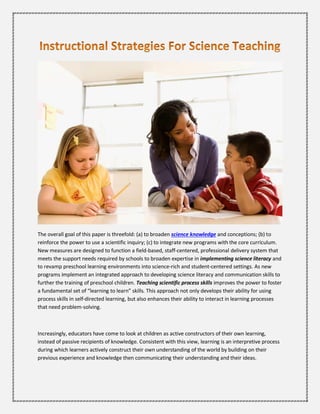
Instructional Strategies For Science Teaching
- 1. The overall goal of this paper is threefold: (a) to broaden science knowledge and conceptions; (b) to reinforce the power to use a scientific inquiry; (c) to integrate new programs with the core curriculum. New measures are designed to function a field-based, staff-centered, professional delivery system that meets the support needs required by schools to broaden expertise in implementing science literacy and to revamp preschool learning environments into science-rich and student-centered settings. As new programs implement an integrated approach to developing science literacy and communication skills to further the training of preschool children. Teaching scientific process skills improves the power to foster a fundamental set of “learning to learn” skills. This approach not only develops their ability for using process skills in self-directed learning, but also enhances their ability to interact in learning processes that need problem-solving. Increasingly, educators have come to look at children as active constructors of their own learning, instead of passive recipients of knowledge. Consistent with this view, learning is an interpretive process during which learners actively construct their own understanding of the world by building on their previous experience and knowledge then communicating their understanding and their ideas.
- 2. Thus, achieving a world-class standard of science literacy among this nation’s next generation of youngsters and youth requires major rethinking in curriculum reform. For too long, our education system has viewed the technique of learning science as a process of meaningful learning and textbook dependent activities. Science learning can and will specialize in stimulating, real-world problems that provoke and nurture children’s natural curiosity, insight, and skill to find out. Today, there's an increasing call among science educators for fundamental changes in course content and modes of instruction to extend students’ preparedness in science. The aim of this study is twofold: (a) to supply professional development for teachers, assistants, and parents of low-income preschool children through a science-rich, student-centered environment that emphasizes the evolution of appropriate skills and attitudes in using an inquiry approach to science literacy; and (b) to organize participants to make a lifelong interest in science for themselves and therefore the students. Science curriculum materials are going to be developed to help teachers and parents to heighten and nurture children and families’ willingness to study and to become more capable, comfortable, confident and passionate about increasing their own and therefore the children’s “natural curiosity” about the world. New programs seek to enhance the capacity of families and teachers to raise and enhance the lives of young children in three specific ways: (a) ensuring that all children start school able to learn; (b) enhancing teachers’ ability to foster the science literacy of youngsters and parents; and (c) promoting partnerships to extend parental involvement and participation. Findings from an ethnographic interview that specialize in the teaching and learning of science show that the teachers, assistants, and parents have increased their ability to make and manage school learning environments that provide preschool learners with a chance to test their own ideas, engage in cooperative learning and exploration, learn from the ideas of their colleagues, and generalize from one context to another. New criteria have also transferred the science inquiry approach to learning both at home and in other educational environments, like museums, zoos, aquariums, libraries, and other cultural and academic resources. The classroom tasks became more student directed, collaborative, and interactive. Teachers are incorporating science activities into other learning situations, thereby fostering communication development. Children are asking more questions and communicating more with one another. Much has been accomplished, suggesting that expanding the Science program could lead on to even greater effectiveness of ensuring that children start school able to learn.
- 3. Several policy and practical implications may be drawn from the work done. First, new programs must involve parents in their efforts to reinforce the lives and learning of youngsters and make sure that all children start school able to learn. Parental behavioral expectations for his or her children have important long-term implications in children’s “natural curiosity” to discover. Second, collaboratively involving teachers and guardians in new activities enhances children’s capacity to study in class and at home. Intervention programs designed to incorporate parents and teachers have a robust and positive impact on promoting the readiness of youngsters to learn. In order to bolster the sustained readiness of all children to study, support must be provided for collaboration among schools, parents, and therefore the community as ideas for useful strategies are developed, implemented, and evaluated. Source: https://ebookschoice.com/instructional-strategies-for-science-teaching/
